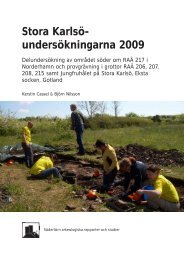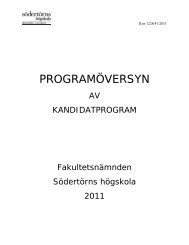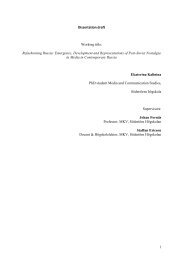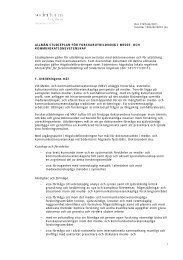Underlying Reasons for the Persistence of Female Genital Mutilation
Underlying Reasons for the Persistence of Female Genital Mutilation
Underlying Reasons for the Persistence of Female Genital Mutilation
Create successful ePaper yourself
Turn your PDF publications into a flip-book with our unique Google optimized e-Paper software.
1.6 Delimitations <br />
It can be most misleading to generalize about <strong>the</strong> social position <strong>of</strong> women in societies that<br />
practice FGM because <strong>of</strong> <strong>the</strong> difference in history, culture and ethnicity in which this practice<br />
occurs. It is highly important to acknowledge <strong>the</strong> gender perspective <strong>of</strong> <strong>the</strong> issue as it is a crucial<br />
part <strong>of</strong> <strong>the</strong> circumstances; however this study does not aim to examine this perspective as <strong>the</strong><br />
purpose is to look into <strong>the</strong> social conventions <strong>of</strong> FGM and <strong>the</strong> paradox within and against it.<br />
Fur<strong>the</strong>rmore <strong>the</strong> focus <strong>of</strong> this study is to understand <strong>the</strong> continuation <strong>of</strong> FGM through by<br />
analyzing <strong>the</strong> past, present and future. Previous studies have been carried out about FGM in<br />
Tanzania where <strong>the</strong> focus has been on <strong>the</strong> different methods and <strong>the</strong> general overview on <strong>the</strong><br />
practice, this study will <strong>the</strong>re<strong>for</strong>e try to shed light on what makes FGM continue.<br />
1.7 Sources and Materials <br />
This study is based on primary and secondary data. The primary data are collected by a field<br />
study in Babati, Tanzania. The secondary data comprehends scientific studies and literature<br />
about FGM. General facts on FGM will be based on <strong>the</strong> literature <strong>of</strong> E. Dorkeeno that gives a<br />
comprehensive overview <strong>of</strong> <strong>the</strong> issue, especially in Africa. Her research is based on various<br />
testimonials, previous research and case-studies that present how to deal with <strong>the</strong> diverse<br />
experiences <strong>of</strong> FGM found in different parts <strong>of</strong> <strong>the</strong> world. Fur<strong>the</strong>rmore <strong>the</strong> study will include<br />
sources by UNICEF, WHO and <strong>the</strong> UN. These organizations play an important role since <strong>the</strong>y<br />
have a clear agenda about FGM. These sources are up to date with yearly reports and statistics<br />
about <strong>the</strong> issue.<br />
6

















